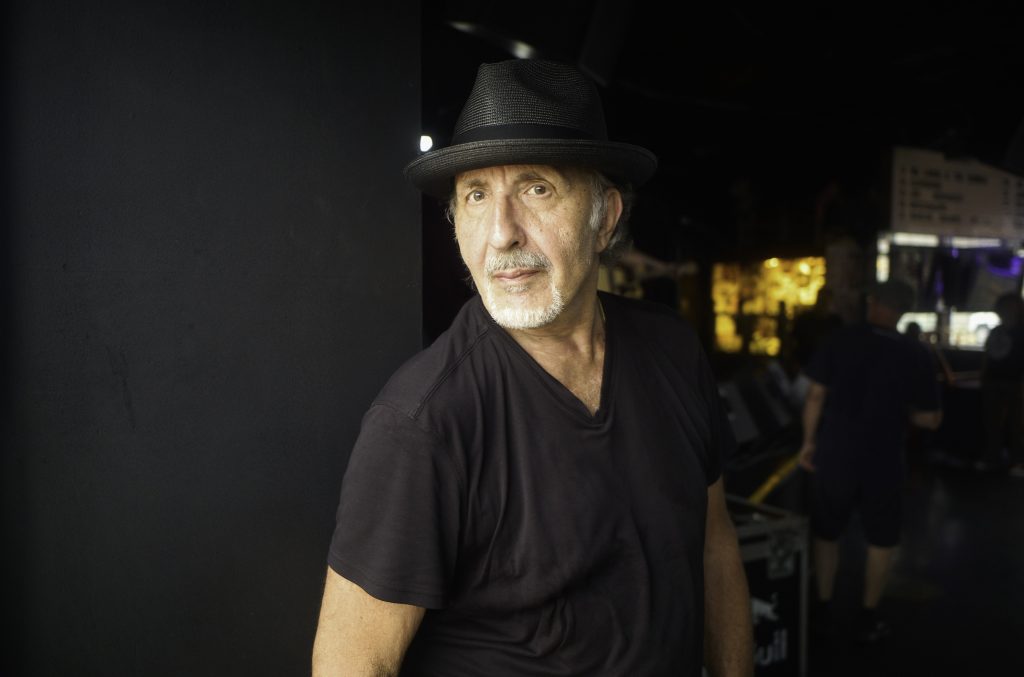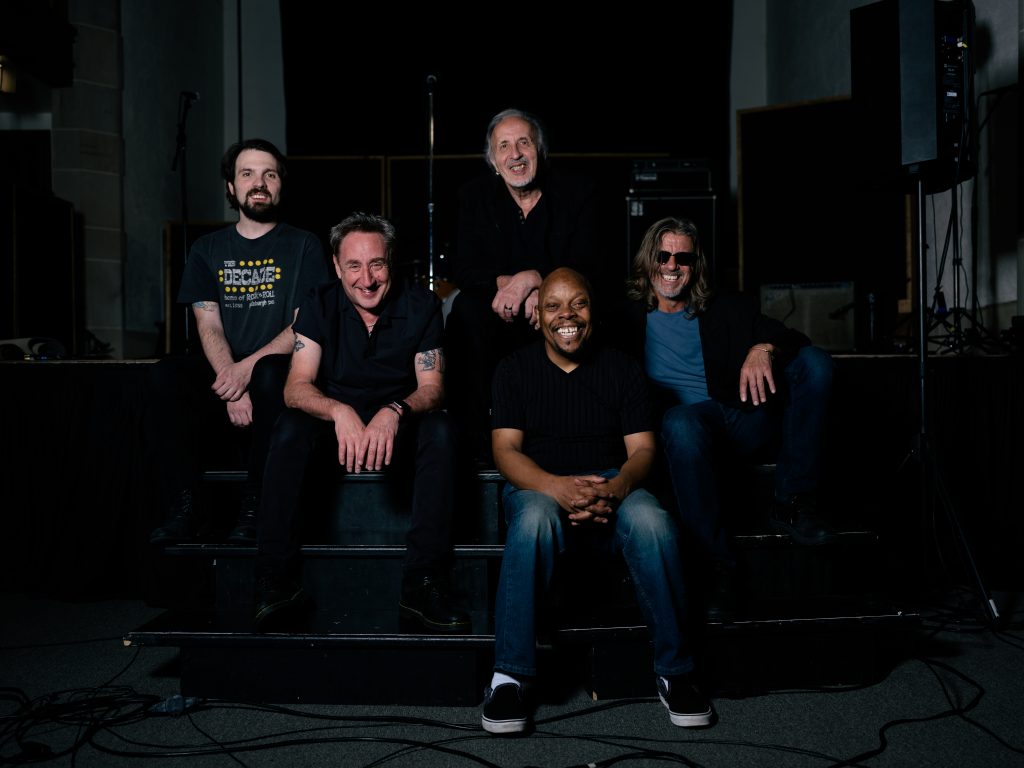Joe Grushecky and The Houserockers Dream On with ‘Can’t Outrun a Memory’
First new studio album for the band in seven years.
- Like
- Digg
- Del
- Tumblr
- VKontakte
- Buffer
- Love This
- Odnoklassniki
- Meneame
- Blogger
- Amazon
- Yahoo Mail
- Gmail
- AOL
- Newsvine
- HackerNews
- Evernote
- MySpace
- Mail.ru
- Viadeo
- Line
- Comments
- Yummly
- SMS
- Viber
- Telegram
- Subscribe
- Skype
- Facebook Messenger
- Kakao
- LiveJournal
- Yammer
- Edgar
- Fintel
- Mix
- Instapaper
- Copy Link

Joe Grushecky, ready to rock the house. (Photo: Danny Clinch)
Joe Grushecky has long been seen as a standard bearer of the Pittsburgh music scene. And almost like a personification of the town he loves, he also has had love, frustration, setbacks, resiliency, and triumphs in his own life. Grushecky looks out for his own, gives credit where credit is due, and is a social and environmental justice warrior much like his friend and sometime musical collaborator—Bruce Springsteen. Many of these thematic elements can be heard in his latest album, Can’t Outrun a Memory. Joe Grushecky and the Houserockers’ latest LP is set for release July 12 on Omnivore Records.
Grushecky is having a career renaissance. His first play, East Carson Street, about members of a Pittsburgh family from the ‘80s to present day, was in workouts in New Jersey in May for possible future runs in Pittsburgh and New York City. The play, written with playwright Jonathan Rosenberg, Grushecky said, “was well received.” Last month he released an anthology LP, Joe Grushecky: Houserocker, A Joe Grushecky Anthology, also on Omnivore Records.
Grushecky spoke via phone with Entertainment Central about his band’s new release, saying that the inspiration for Can’t Outrun a Memory was dreams. ”I was having dreams about that particular era,” he said. “That’s what started spiking it. I started thinking about 1968. That particular year was a big year for me. I bought my first Telecaster that year. I had gone to college and I lost track of music, they wouldn’t let me have a guitar there. I finally grew up enough to have my own apartment and decided I was going to go back and play guitar again and get into a band.
“I was also involved in a terrible car accident where a couple people were taken from us. I started having dreams about that. Not in a panic way. What sealed the deal was I was watching TV one night and there was a documentary about the year 1968 and everything started flowing. What I did with the record is, it starts out with ‘Who We Are,’ which is me now, my family now. The rest of it goes back and forth between here we are now in 2024 and that particular journey that started in 1968 and this is what happened along the way for me to get here.”
Detailing the Tracks
The first track of the album starts out with trademark Houserocker guitars, bass, and drums. Grushecky sings about what they stand for. There’s even a cool “Easter egg” in it with the lyric, “Been doing this since ‘79 / Had a good time, but got out alive.” This song is red meat for the longtime Houserocker fan. It is the lead track for a reason, it could arguably be the best song on an album chock full of great ones. Grushecky sings, “This is who we are / This is how we roll / I’m going to follow that dream / Wish upon a star,” resonating the dream theme.
“Here in ‘68,” rocks with meaning and wisdom. Grushecky sings about trying to “Keep the faith” in that tumultuous year. The song recalls tragic events like the shootings of Martin Luther King and Bobby Kennedy and the Vietnam war. It also details some fun cultural touchstones such as Jimi Hendrix, The Beatles, and Mrs. Robinson. Lead guitarist Danny Gochnour creates a subtle Beatle-esque sitar sounding effect on several parts of the song. At the end Grushecky and band are singing the lyrics “All You Need is Love” and the song ends abruptly.
On the title track, “Can’t Outrun a Memory,” another quality rocker, Grushecky sings more truth, “I wish we could go back when / Sometimes it’s hard to see what’s right in front of me / I can’t escape what’s haunting me / And I can’t outrun a memory.” The song also possibly references the 1968 car accident with, “Our fate can’t be explained / Please somebody tell me why / Some get taken away / And some get left behind.” The Clarks’ Scott Blasey sings background vocals on a part of the song.
“Just Drive” sees Grushecky singing about the therapeutic aspects of taking a drive to clear the head and the worries. There’s a great acoustic opening by Johnny Grushecky (Joe’s son) and repeating lead guitar riffs throughout. “Sleeping Dog” is a blues burner of a song with very impressive lead guitar play and effects by Gochnour. Grushecky sings about the proverbial saying regarding letting a sleeping dog lie. There’s also an interesting line in the song that says, “I know that loving me has never been easy / There was a ton of tears baby you had to cry.”
Grushecky also wrote a song inspired by three great friends who have since passed on, Patrick, Pooch, and Gizzy. He spent a very fun winter with them long ago in the Florida Keys. He said, ”I was just thinking about them and boom, that song popped into my head. It’s a bit of a toast too. A tribute to all our friends.” It sounds like a classic rock song from the ‘80s and is so good you’ll want to “pour one out” for those you’ve lost too.
“If These Walls Could Talk” has a Rolling Stones-style guitar and drums intro and speaks about the factories along the Pittsburgh rivers and the people that worked there, but no one could “stop the hands of time” and the mills are no more.
Continuing the industrial theme is “Living in Coal Country.” Grushecky came from very humble beginnings, the son of a coal miner with miners on several branches of his family tree. His father started working in the mines at the age of 12, eventually developing black lung disease. Grushecky’s earliest years were in Hutchinson, Westmoreland County, before the family moved to Biddle, also in Westmoreland County. His father worked at the Hutchinson Mine.
The song starts out almost like a hard rock funeral dirge. Jeffrey “Joffo” Simmons bangs his kit hard, Gochnour blazes killer guitar runs along with Johnny also on electric, while Grushecky plays acoustic guitar and wails away on the harmonica. Jeff Garrison gives the song a solid foundation on bass. I asked Grushecky about the guitar drenched song and he laughed and said, “It’s almost like a Led Zeppelin song. On that song we fattened up the guitars.” Joffo’s drums, Gochnour and Johnny’s lead guitar riffs, and Grushecky’s harmonica burn together for a heat hotter than any vintage miner’s carbide lamp flame. The lyrics are pregnant with historical realities about the struggles and injustices in coal country. One lyric says, “While the company blows up another mountain top / The brown dust mixes with the falling rain / When you do a deal with the devil / You lose all rights to complain.” Grushecky’s powerful vocals give added depth and impact to the track.
The man-made climate change from the world’s unhealthy, drug-like addiction to fossil fuels is addressed in the rocker, “Who’s Fooling Who.” Lyrics call out the costs, “Poison in the soil and water that we drink / Better wake up now people it’s later than we think.” A cool part of the song is when Grushecky prompts the band to sing the background vocals by saying, “Housreockers sing.”
Can’t Outrun a Memory also offers a hopeful solution to the world’s problems with the song, “Let’s Cross the Bridge.” Grushecky said “We all cross the bridge sometimes. I want us to be good again. The country seems so divided. The country has lost its way in some ways. I was listening to gospel music and in the immortal words of War, ‘Why can’t we be friends?’ I was trying to come up with a song like that. This song basically wrote itself after I started working on it.”
“Let’s Cross the Bridge” starts out with organ music that makes you feel like you’re in the front pew of a church on Sunday. The band kicks in with a steady inspirational rock groove. Grushecky jubilantly sings in a very soulful voice, “Let’s cross the bridge / And wade into the water / There’s a revival on the other side.” Grushecky explained that “The organ on the song was by a gentleman from New Jersey, Jeff Levine. He was the music director for Joe Cocker and he plays with us when we go out to Jersey. Stevee Wellons and Melinda Colaizzi provided the strong and soothing background vocals and chorus.”
A beautiful song on the album that speaks about that very special first love we all have is “Rocked My Soul.” Gochnour has a fantastic guitar outro on it and Joe Munroe, of the Ghost Hounds, played keyboards. There’s also a fun, Houserocker-fied version of the classic Animals song, “We Gotta Get Outta This Place.” Several bonus tracks including “Leave Well Enough Alone” round out the recording.

The Houserockers (l. to r.): Johnny Grushecky, Danny Gochnour, Joe Grushecky, Joffo Simmons, and Jeff Garrison.
“On this album we stripped down, [it’s] all guitars, keyboards on just a few songs,” Grushecky said. “We had five guys in the band and Rick Witkowski [the album’s producer] playing occasional guitar, so it’s really a guitar-oriented record. Danny just shines on it. This record should make Danny a star If there’s any justice in the world.” On the album Gochnour plays a variety of guitars including a Stratocaster and a Paul Reed Smith. Grushecky plays Telecaster and acoustic guitars. Johnny plays Gibson Hummingbird and Martin acoustic guitars and a Les Paul when playing electric. “It all gave us a nice thick sound,” Grushecky said. Joe also gave raves to Simmons and Garrison for their outstanding play and input on the album.
Grushecky’s voice sounds as good as ever, showing a versatility required by the many different tracks on the album: sometimes rock, sometimes blues, sometimes punk, and even a little gospel. His Telecaster, acoustic, and harmonica playing also add a depth and richness to Can’t Outrun a Memory.
Grushecky said, “Johnny takes care of the business side of the band. It’s pretty much a democracy as far as the music goes. I have the final say, but everyone has their two cents in and Rick Witkowski also because he’s sort of like an unofficial member. We’ve been doing records together for so long he brings a lot to the table too. This record as for playing goes was a collaborative effort, but then Johnny and Brian Coleman, our sound manager, added a lot of sonic touches at the end [in production]. Rick mixed it to make it sound the way that it did. They made sure everything was in its place. That everything could be heard clearly. Paid particular attention to the guitar sound.”
“This was a fun record to make. We took our time; with the pandemic we were really not in any hurry. When we did finish it we started talking to Omnivore [Records] and that took about six to eight months and everyone was relaxed and we got the most out of the songs,” Grushecky said. In regard to the variety of different song genres on the album, Grushecky replied, “I was lucky to grow up in an era where there was a lot of musical diversity that I was exposed to. We try to reflect that in our music.”
Lyrically Speaking
I asked Grushecky about his almost poetic, insightful lyrics and he said, “I grew up being maybe not a voracious reader, but I didn’t have a TV until I was in my thirties, so I read all the time. I just have an appreciation for fine literature. I try to do my best to make the words count when I write a song.
“I pay special attention to my lyrics. I try to tell a story the way I would speak as I was speaking to you on the phone. I craft the lyrics, spend a lot of time working on the lyrics. Musically I write all the songs myself. I started on this album before the pandemic and with it I had a lot of time spent alone. Some songs just come to you. When I’m writing a record I think I’m writing a story, a screenplay, or a movie. I can see it in my head and I need a beginning, a middle, and an end. Sometimes I’ll be writing and writing and writing and I don’t know if they’ll ever fit together and then boom, it will lead me to something that links all these thoughts together in my head. It leads me to be able to complete my thoughts of a particular direction I’m going in. The thoughts about you know, I’m here right now, this happened in 1968 and if it didn’t happen in 1968 everything would have changed. All of my life would have been completely different.

Joe Grushecky performing with his favorite instrument, a Telecaster.
“Musically then I usually just do the stuff on my own then I go put a demo down and then give it to the band. The band then works on it with Rick Witkowski, they do their parts. This record was basically my son and Rick had a lot to do with the arrangements. Then the band brought in all their talent. Danny, Jeff Garrison, and Joffo all contributed. When it got to the end, Rick Witkowski, Brian, plus my son spent a lot of time mixing it. So it’s a real team effort.”
From “Here in ‘68” to “This is Who We Are,” Can’t Outrun a Memory examines musically a life well-lived and the paths taken, and not taken. Joe Grushecky and The Houserockers, like a finely tuned race car, have a pleasant purr at low speed and a beautiful roar in high gear.
Can’t Outrun a Memory is available on Omnivore Records. Grushecky and The Houserockers will have record release parties at The Wonder Bar in Asbury Park, New Jersey, July 20; City Winery in Pittsburgh, July 27; and Jammin Java in Vienna, Virginia, August 3.
Rick Handler is the executive producer of Entertainment Central.
Share on Social Media
- Like
- Digg
- Del
- Tumblr
- VKontakte
- Buffer
- Love This
- Odnoklassniki
- Meneame
- Blogger
- Amazon
- Yahoo Mail
- Gmail
- AOL
- Newsvine
- HackerNews
- Evernote
- MySpace
- Mail.ru
- Viadeo
- Line
- Comments
- Yummly
- SMS
- Viber
- Telegram
- Subscribe
- Skype
- Facebook Messenger
- Kakao
- LiveJournal
- Yammer
- Edgar
- Fintel
- Mix
- Instapaper
- Copy Link
Follow Entertainment Central
Sign up for the EC Newsletter
Latest Stories







